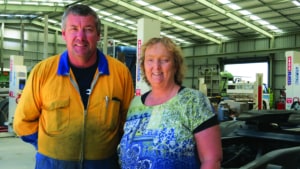
Ken & Jo Cameron
People who want to secure a good future for themselves in Gisborne should seriously consider getting into a trade, say two local businessmen.
“It’s a field that has been undervalued by the system for many years. For generations students have been told that if they want
to do well they should go to university. In reality some of the most successful people in our community started their business
careers as apprentices,” says Currie Construction project manager Mark van Wijk.
Likewise Ken Cameron, who owns Camech, arguably the biggest heavy vehicle maintenance centre in Gisborne, says there is a big future here for skilled heavy vehicle mechanics, and in fact for all qualified automotive technicians.
We just can’t get enough qualified people,” he says.
After 12 years in business Ken and his wife Jo moved to their six bay purpose-built Camech truck and trailer service centre two
years ago and already need to expand further.
“The trucking industry here is growing rapidly and we need more people to gear up for it,” he says.
He welcomes the new Level 4 automotive apprenticeship programme EIT is offering this year and is urging people to take
advantage of it.
“We can teach an apprentice the practical side but it is much better if they have a classroom in which to do their theory rather
than trying to do it by themselves at home after work.”
Ken Cameron left school in Gisborne to study at Massey University but found it boring and took up a mechanical
apprenticeship instead.
Apprentices are paid while they train and once they qualify are into the serious money.
“These are exciting times within the trades industry, the salary packages, professional development and access to international
platforms have never been so available” says EIT assistant head of the School of Trades and Technology Tim Jagusch.
Many trades people move into managerial roles and salary packages are accelerating as the industry expands and struggles
to fill skill shortages, he says.
Construction and other technical industries today need young people who can use their intelligence as well as their hands, says
Mark van Wijk.
“In this day and age, builders and engineers need to be conversant with quantity surveying, design technology, project
management and virtual reality scoping.
“The old belief that apprenticeships are only for those who can’t get into university is doing industry a huge disservice,” he says.
“We need clever and enthusiastic people who are willing to learn.
“EIT has the facilities, systems and skilled tutors to get people into the top of the field. But people need to stop viewing
technical jobs as the last resort.”
0800
